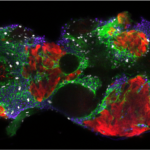Friday 19th February — at 12.00 — Amphi Monod (Bât.66)
Invited Speaker : Louisa Dandolo
From Department of Development, Reproduction and Cancer, Institut Cochin – Paris, France
Hosted by Jean-Jacques Panthier
Abstract : The H19 gene was identified as one of the first imprinted genes, with Igf2 and Igf2r. It is strongly expressed during embryogenesis but its role remained unknown for a long time. In humans, the H19-Igf2 locus is associated with the Beckwith-Wiedemann syndrome, which leads to overgrowth of the affected children and increased susceptibility to tumours. H19 produces a long non coding RNA (ncRNA) as well as a highly conserved microRNA, miR-675. We produced mutant mice invalidated for H19, called H19D3, which display an overgrowth phenotype. We identified a role for the H19 ncRNA in the control of nine genes of an imprinted gene network (IGN), controlling growth of the embryo. The H19 RNA binds the chromatin remodelling protein MBD1 and this complex modulates the level of H3K9me3 on target genes. In parallel, in collaboration with Wolf Reik’s group, the miR-675 was shown to control placental growth at the end of gestation by targeting the Igf1r gene. Using mouse models of tumourigenesis, the H19D3 model was also used to show that H19 acts as a tumour suppressor gene. Finally, H19 expression is strongly down-regulated in adults, with the exception of skeletal muscle. Its role in controlling entry into quiescence and self-renewal capacity of the muscle satellite cells was recently identified.
